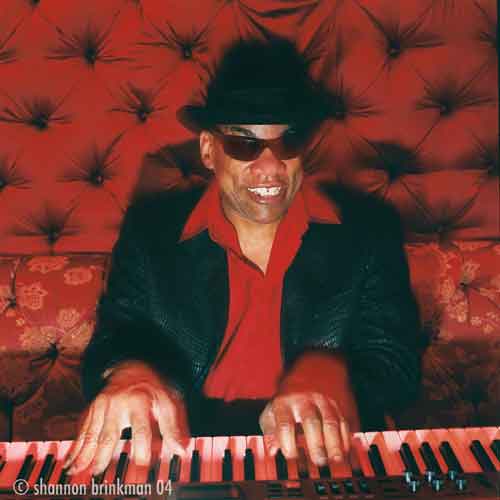Just Add Jambalaya...
By David McGee
PiaNOLA LIVE
Henry Butler
Basin Street RecordsA true artifact of Hurricane Katrina, native New Orleanian Henry Butler's PiaNOLA Live is a collection of solo piano performances spanning a period of two decades, salvaged from Butler's tape archive, which miraculously survived the storm's near-total destruction of his home and possessions. Considering the timeframe, it's a remarkably seamless presentation, kudos going to Butler and his producer, George Winston (a pretty fair piano player himself) for their work in the flawless sonic assembly of these eleven numbers.
Beyond that, Butler has made it easy to enjoy PiaNOLA Live on multiple levels. Listen for the pure pleasure of hearing one of the Crescent City's finest piano players at the top of his game, brimming with energy, spirit, wit and intellect. You don't have to know anything about the history behind the songs or the complexity of Butler's approach to luxuriate in the timeless glow of his rich treatment of "Basin St. Blues," or to bop along with his driving attack and humorous lyrical rewrites of Ernie K-Doe's classic "Mother In Law," or to feel his weary soul on a winsome blues ballad treatment of "Old Man River." Making no effort to take on Otis Redding, he comes at "(Sittin' On) Dock of the Bay" from the vantagepoint of gospel testifying, both in the laments and shouts of his vocal attack and in the forceful chording and ornate fills rushing into the verses at regular intervals; and he does the same thing with former Louisiana Gov. Jimmie Davis's enduring warhorse, "You Are My Sunshine," slowing it down and deliberately imparting the lyrics while filling all the space between the singing with evocative arpeggios that heighten the emotion, which, depending on one's point of view, either recasts the tune as a hymn praising God's glory or reveals a rarely investigated blue tinge to the Gov's sweet nothings.
For those listeners who are interested in what Butler is actually doing on the 88s, from a technical standpoint, Winston has provided an enlightening song-by-song analysis in the liner booklet, pointing out key changes and stylistic flourishes and how these affect the interpretation in question. For instance, on Butler's own delightful six-minute "Orleans Inspiration," Winston notes that piece as a whole embraces a host of New Orleans musical traditions "and adds the ones that Henry himself has contributed, such as playing expanded funky bass lines, expanded use of the partial 9th chord inversions, and modulating up a minor third interval..." When we get to a jaw-dropping rendition of Professor Longhair's classic "Tipitina," Winston proves a most useful guide, because Butler, knowing 'Fess wouldn't cotton to him merely imitating the original, dives into fresh waters. He begins the song with a stately, hymn-like opening section (which must have baffled the audience) before gradually picking up the pace and exploring other avenues of the melodic foundation. Almost three and a half minutes into the piece we hear the first faint notes of the familiar version and near the four-minute mark Butler is wailing a gutsy vocal and embroidering it with a rich, colorful rhythmic garland that we learn from Winston's notes is powered by a technique Butler invented, "powerful two hand phrases in the right-hand range of the piano, where the left and right hand act as one, with the left hand playing what would normally be played with the right hand thumb, giving more power and percussion to the phrases." This may be too much musicology for some, but Winston never goes overboard with it, offering only the necessary insight to account for Butler's virtuosity and inventiveness, and to deepen the listening experience for musos and casual fans alike.
And finally, with New Orleans still a long way from being healed (although a recent New York Times report that more than 100 new restaurants have sprung up in the city post-Katrina is a heartening sign of renewal and vitality), Henry Butler's adventurous explorations remind us again of the resilience of New Orleans music to remain resolutely itself even as it invites new spins on its timeless traditions. Hence, "Dock of the Bay" and a church-rooted interpretation of Billy Preston's ("a guy who influenced me, especially in my R&B development," Butler tells the audience) "Will It Go 'Round in Circles" sound as much a part of the bayou as the rollicking take on Chris Kenner's "Something You Got," along with the aforementioned "Tipitina" and "Mother In Law." Dish up some jambalaya when you spin this disc, and you got something going.
THE BLUEGRASS SPECIAL
Founder/Publisher/Editor: David McGee
Contributing Editors: Billy Altman, Derk Richardson
Logo Design: John Mendelsohn (www.johnmendelsohn.com)
Website Design: Kieran McGee (www.kieranmcgee.com)
Staff Photographers: Audrey Harrod (Louisville, KY; www.flickr.com/audreyharrod), Alicia Zappier (New York)
E-mail: thebluegrassspecial@gmail.com
Mailing Address: David McGee, 201 W. 85 St.—5B, New York, NY 10024
Founder/Publisher/Editor: David McGee
Contributing Editors: Billy Altman, Derk Richardson
Logo Design: John Mendelsohn (www.johnmendelsohn.com)
Website Design: Kieran McGee (www.kieranmcgee.com)
Staff Photographers: Audrey Harrod (Louisville, KY; www.flickr.com/audreyharrod), Alicia Zappier (New York)
E-mail: thebluegrassspecial@gmail.com
Mailing Address: David McGee, 201 W. 85 St.—5B, New York, NY 10024


